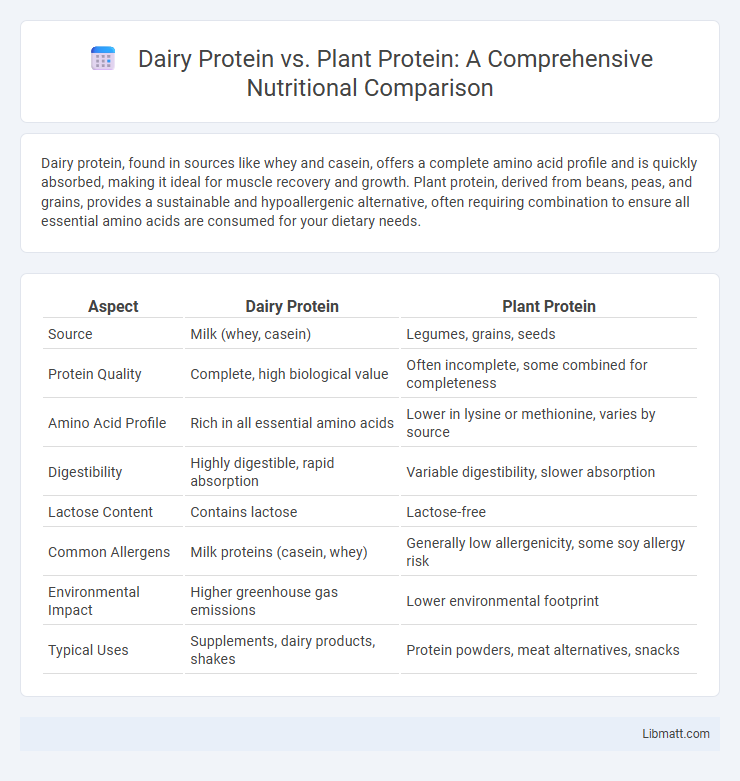Dairy protein, found in sources like whey and casein, offers a complete amino acid profile and is quickly absorbed, making it ideal for muscle recovery and growth. Plant protein, derived from beans, peas, and grains, provides a sustainable and hypoallergenic alternative, often requiring combination to ensure all essential amino acids are consumed for your dietary needs.
Table of Comparison
| Aspect | Dairy Protein | Plant Protein |
|---|---|---|
| Source | Milk (whey, casein) | Legumes, grains, seeds |
| Protein Quality | Complete, high biological value | Often incomplete, some combined for completeness |
| Amino Acid Profile | Rich in all essential amino acids | Lower in lysine or methionine, varies by source |
| Digestibility | Highly digestible, rapid absorption | Variable digestibility, slower absorption |
| Lactose Content | Contains lactose | Lactose-free |
| Common Allergens | Milk proteins (casein, whey) | Generally low allergenicity, some soy allergy risk |
| Environmental Impact | Higher greenhouse gas emissions | Lower environmental footprint |
| Typical Uses | Supplements, dairy products, shakes | Protein powders, meat alternatives, snacks |
Introduction to Dairy and Plant Proteins
Dairy proteins, such as whey and casein, offer complete amino acid profiles and are rapidly absorbed, supporting muscle recovery and growth efficiently. Plant proteins from sources like peas, soy, and rice often require combining different types to achieve a complete amino acid spectrum and provide fiber and antioxidants. Understanding the unique benefits of dairy and plant proteins helps you choose the most suitable option for your dietary needs and fitness goals.
Nutritional Composition of Dairy Protein
Dairy protein, primarily composed of casein and whey, offers a complete amino acid profile that supports muscle repair and growth efficiently. Rich in branched-chain amino acids (BCAAs), particularly leucine, it enhances protein synthesis more effectively than most plant proteins. Additionally, dairy protein provides essential micronutrients such as calcium, which are less abundant in plant-based protein sources.
Nutritional Composition of Plant Protein
Plant protein sources such as peas, lentils, and quinoa provide essential amino acids, fiber, vitamins, and minerals like iron and magnesium, offering a nutrient-dense profile beneficial for your overall health. Unlike dairy protein, plant proteins often contain lower levels of leucine but are rich in antioxidants and phytochemicals that support immune function and reduce inflammation. Incorporating diverse plant protein sources enhances the nutritional balance by providing dietary fiber and micronutrients not typically found in dairy proteins.
Digestibility and Bioavailability
Dairy protein, such as whey and casein, offers higher digestibility and bioavailability compared to most plant proteins, providing your body with a complete amino acid profile essential for muscle repair and growth. Plant proteins like pea and rice may have lower bioavailability due to anti-nutritional factors and incomplete amino acid profiles, but combining different sources can improve their overall effectiveness. Choosing dairy protein supports faster absorption and more efficient nutrient utilization, crucial for optimizing muscle recovery and performance.
Essential Amino Acid Profiles
Dairy protein, particularly whey and casein, offers a complete essential amino acid profile with high levels of leucine, isoleucine, and valine, which are critical for muscle protein synthesis. Plant proteins like pea, rice, and soy often lack one or more essential amino acids, such as methionine or lysine, making them less bioavailable unless combined properly. Research shows that combining complementary plant proteins can improve amino acid profiles to approach the completeness of dairy proteins.
Health Benefits of Dairy Protein
Dairy protein provides a complete amino acid profile essential for muscle repair and growth, making it highly effective for athletes and active individuals. It also contains bioactive peptides that support immune function and promote bone health through calcium and vitamin D content. Your body can efficiently absorb and utilize dairy protein, aiding in weight management and maintaining lean muscle mass.
Health Benefits of Plant Protein
Plant protein offers numerous health benefits including improved digestion due to its high fiber content, which supports gut health and helps regulate blood sugar levels. Rich in antioxidants, vitamins, and minerals, plant proteins contribute to reducing inflammation and lowering the risk of chronic diseases such as heart disease and diabetes. Incorporating plant protein into your diet can also promote weight management and provide essential amino acids when consumed through diverse sources like legumes, nuts, and seeds.
Environmental Impact Comparison
Dairy protein production generates significantly higher greenhouse gas emissions and requires more water and land resources compared to plant protein sources such as peas and soy. Lifecycle assessments show plant-based proteins have a lower carbon footprint, contributing less to deforestation and biodiversity loss. Choosing plant protein options reduces environmental strain while supporting sustainable food systems.
Suitability for Dietary Preferences and Restrictions
Dairy protein, derived from milk sources like whey and casein, is suitable for individuals without lactose intolerance or dairy allergies, offering complete amino acid profiles vital for muscle repair and growth. Plant protein, sourced from peas, soy, rice, and hemp, caters to vegan, vegetarian, and lactose-intolerant diets, though certain plant proteins may lack one or more essential amino acids requiring careful combination for completeness. Both protein types address dietary restrictions, with plant proteins providing hypoallergenic options and dairy proteins serving those prioritizing high biological value in their nutrient intake.
Choosing the Right Protein for Your Lifestyle
Dairy protein, such as whey and casein, offers complete amino acid profiles and rapid absorption, ideal for muscle recovery and growth in active individuals. Plant protein sources like pea, soy, and rice provide essential nutrients with benefits for digestion and are suitable for vegans or those with lactose intolerance. Selecting the right protein depends on dietary preferences, digestive health, and fitness goals to optimize nutrient intake and support overall lifestyle needs.
Dairy Protein vs Plant Protein Infographic

 libmatt.com
libmatt.com